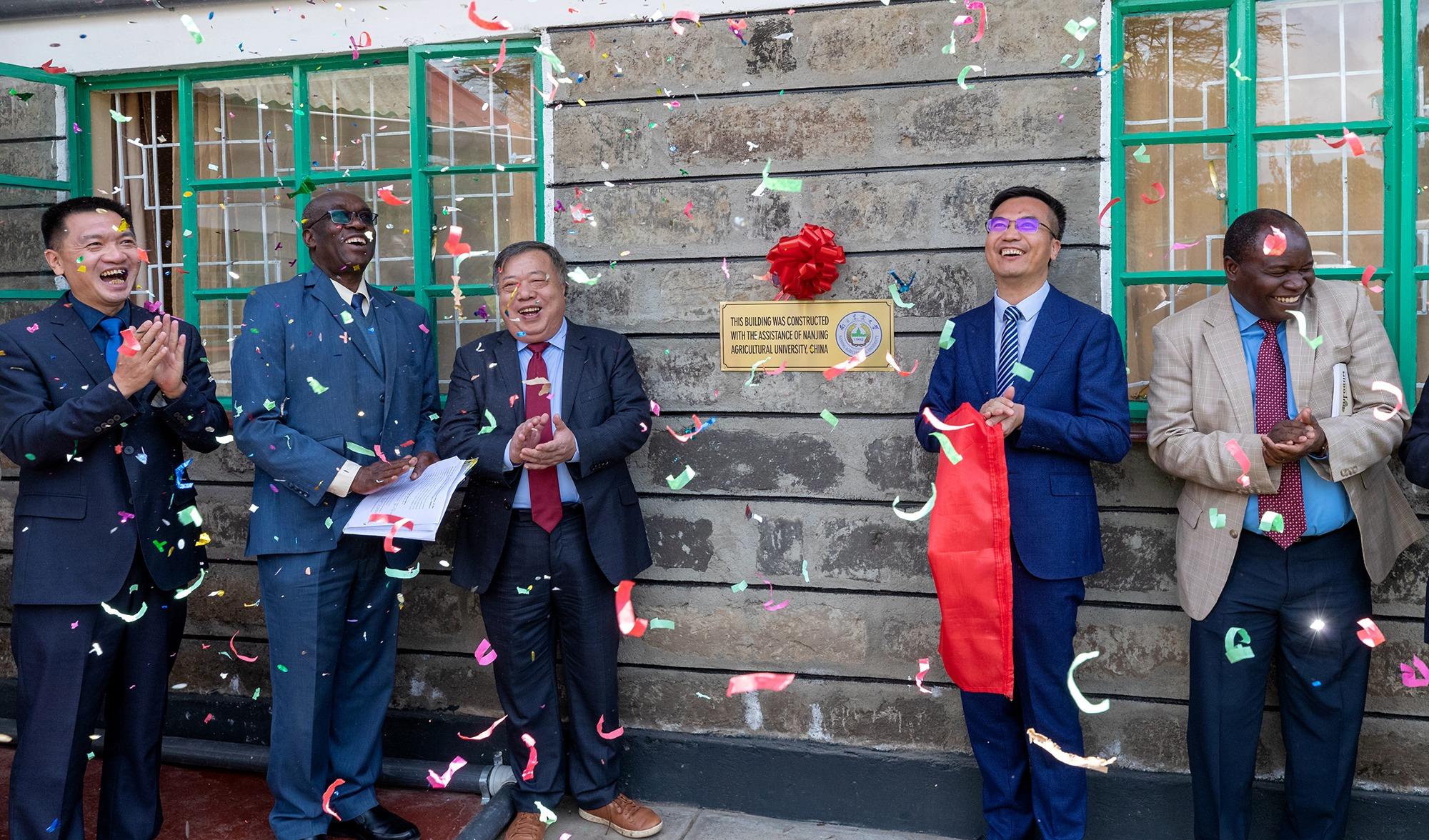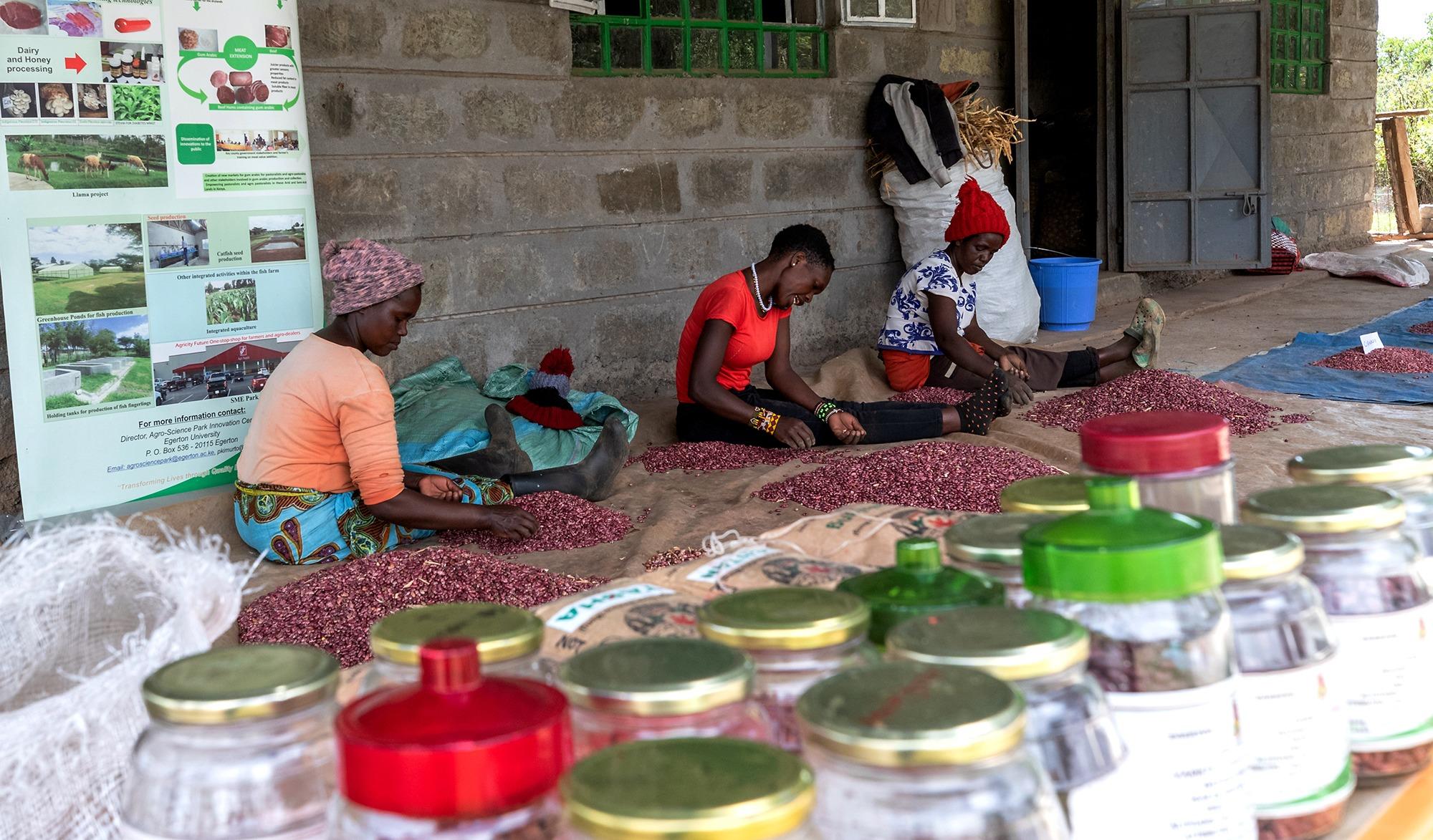Joint research and latest technology transform Kenya's agriculture
 Chen Fadi (second from right), president of Nanjing Agricultural University, and Zhang Yijun (third from left), minister counselor of the Chinese embassy in Kenya, celebrate with faculty members of the Chinese university and Egerton University in Kenya after unveiling a new plaque at the Kenyan school's agro-science park on Sept 18, 2023. (XIE SONGXIN / CHINA DAILY)
Chen Fadi (second from right), president of Nanjing Agricultural University, and Zhang Yijun (third from left), minister counselor of the Chinese embassy in Kenya, celebrate with faculty members of the Chinese university and Egerton University in Kenya after unveiling a new plaque at the Kenyan school's agro-science park on Sept 18, 2023. (XIE SONGXIN / CHINA DAILY)
Editor's note: Uniting continents, transforming lives and imagining a sustainable future on a collective front, the Belt and Road Initiative has demonstrated it is a broad way for China and the world to seek common prosperity. This page highlights the initiative's power of collective efforts in making strides toward sustainable development and tackling global challenges.
"Knowledge shared is knowledge squared," according to an African proverb, implying that once knowledge multiplies it becomes useful to future generations.
By January last year Anna Wanjiku had given up on a tomato greenhouse on her 2-hectare farm in Nakuru County, in southwest Kenya.
The tomatoes, plagued by a disease caused by soil-borne bacteria, ended up delivering her minuscule harvests, and it was impossible for the project to turn a profit.
Things turned around a year ago when lecturers in the faculty of agriculture at nearby Egerton University approached her offering help in dealing with plant diseases through technology developed at Nanjing Agricultural University in China.
Wanjiku has been a beneficiary of the collaboration between the two universities after receiving improved bean seeds developed at a joint research laboratory at Egerton and established through collaboration with the Nanjing university.
The seeds, named Chelalang beans, can be planted during both long and short rain seasons and are tolerant to root rot disease and high soil acidity.
Having improved her beans yield from working with the joint laboratory, Wanjiku did not hesitate to offer her farm to be used as a demonstration center for teaching other farmers how to use technology to manage bacterial wilt disease.
With the help of Nanjing Agricultural University and Egerton University her dilapidated green house was refurbished and later used as a field classroom to educate students, local farmers and county agricultural officers on how to graft tomato scions onto disease-resistant rootstocks. This has enabled local farmers to improve their yields, reduce crop damage and minimize the need for imported pesticides.
"The university approached me about the collaboration on the demonstration village, and I felt what they were planning was going to benefit me and farmers around here," Wanjiku said. "Our area is fertile and receives good rain, and what most farmers lacked was the right technology.
"With the cooperation we have with the university our harvest will be better, and I'm sure many farmers will be able to earn a reasonable living from their farms. We will benefit economically because the crops take a short time but there is more produce."
The demonstration village is part of a proposal that Chinese President Xi Jinping put to the Forum on China-Africa Cooperation in Dakar, Senegal, in 2021 to set up China-Africa joint centers for modern agrotechnology exchange, demonstration and training.
The demonstration village in Nakuru County is one of 10 poverty-reduction and agricultural demonstration projects set up across Africa and is the latest of a number of collaboration projects between Nanjing Agricultural University and Egerton University.
The collaboration between the two universities, which began 28 years ago, has centered on research on hybrid crops and on training farmers and government agricultural employees to improve agronomic practices.
One project is the Kenya-China Joint Laboratory for Crop Molecular Biology at Egerton set up in 2019. It aims to provide state-of-the-art facilities, to train staff and students, to organize staff and student exchange programs, and to engage in joint research and publication.
Richard Mulwa, a professor of horticulture at Egerton University and director of the molecular laboratory, said its establishment was significant and that its potential to help with crop production in the region is immense.
"Earlier on our research in terms of crop development was traditional and conventional, but with molecular biology we can select traits directly from DNA signals that we see could be responsible for particular traits. So instead of dealing with a whole plant observation in the field, we have reduced it to the molecular level where we do gene observation and isolation to get the traits we desire in the crops."
 Workers select groundnut seeds at the agro-science park of Egerton University in Nakuru County, Kenya, on Sept 18, 2023. The China-Kenya Joint Laboratory for Crop Molecular Biology at the university has developed high-yield varieties of beans, groundnuts, cassava, millet and sorghum. (XIE SONGXIN / CHINA DAILY)
Workers select groundnut seeds at the agro-science park of Egerton University in Nakuru County, Kenya, on Sept 18, 2023. The China-Kenya Joint Laboratory for Crop Molecular Biology at the university has developed high-yield varieties of beans, groundnuts, cassava, millet and sorghum. (XIE SONGXIN / CHINA DAILY)
Steady improvements
Liu Gaoqiong, a professor at Nanjing Agricultural University who moved to Kenya in 1997 through the China-Kenya High Education Cooperation Project exchange program, said that since the laboratory was established it has hosted several short virtual training sessions in conjunction with Nanjing Agricultural University, and the laboratory's capabilities have steadily improved, with staff members and students benefiting from collaboration with international molecular biology and biotechnology experts.
Since the laboratory was established, six PhD and 13 master's students have graduated after completing their research. Eight PhD students and 16 master's students are now in session. Through the research by these students the university has developed numerous varieties of crops that have been passed on to local farmers to help tackle problems such as drought, diseases and low yields.
The Chelalang bean variety that Wanjiku plants on her farm is a product of the joint laboratory. For the joint laboratory research products to reach farmers such as her, Nanjing Agricultural University and Egerton University established an agro-science park whose mandate is to promote innovation and products and services developed in the molecular laboratory so they can be commercialized and to ensure that farmers can use the products.
Through the park, high yielding varieties of beans, groundnuts, cassava, millet, sorghum and bacterial wilt-resistant tomatoes have been distributed to farmers across Kenya to improve their output.
During a visit in September, Chen Fadi, president of Nanjing Agricultural University, awarded completion certificates to the trainees in the tomato production and protected horticulture program.
Maurice Omondi, an agricultural officer with Nakuru County, was one of the trainees who received certification.
The establishment of the demonstration village will go a long way in passing on technological knowledge on tomato grafting to farmers, who intend to use the village as a field classroom for farmers from across the county, he said.


